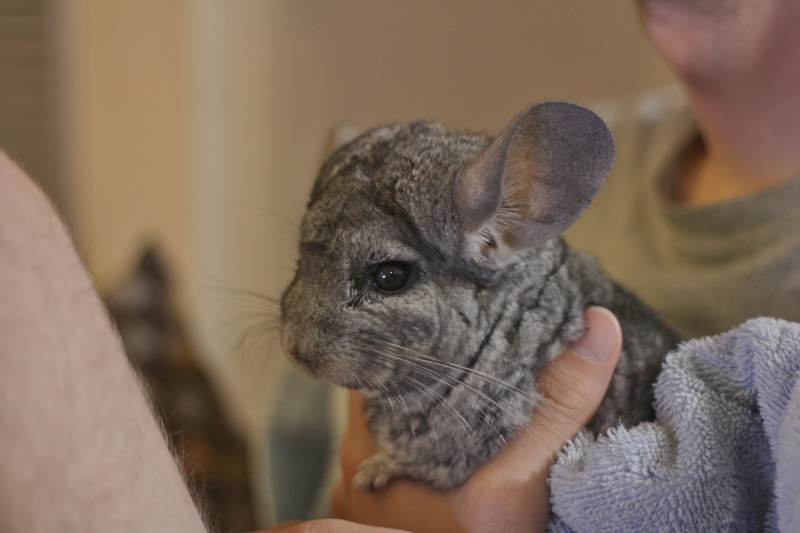Has your chinchilla suddenly stopped eating? Chinchillas are typically active animals and should have a healthy appetite, so it is concerning if they lose interest in food. While there could be many potential causes, the most worrisome possibility is that there may be an underlying medical condition to blame.
In this blog, we will look at some potential causes for why your chinchilla has suddenly stopped eating, as well as what can you do to help encourage them to start eating again. Keep reading.
Why has My Chinchilla Suddenly Stopped Eating?
It is not unusual for chinchillas to suddenly stop eating, and there can be a number of reasons why this might happen. Stress or changes in the environment are common causes of anorexia in chinchillas, so if your pet has recently been moved to a new home or had their routine disrupted then this could be one possible explanation.
Another cause may be illness; while it is uncommon for chinchillas to suffer from serious illnesses, they can sometimes get sick and lose their appetite as a result. If your chinchilla stops eating completely it may indicate that something more serious is going on and you should seek veterinary advice immediately.
In addition to stress or illness, dietary changes may also cause your chinchilla to stop eating. It’s important that you feed them fresh food regularly and provide plenty of hay throughout the day – an unbalanced diet can lead to nutritional deficiencies which can make them feel less inclined to eat.
Additionally, some foods such as fruits and vegetables have high sugar content which can upset the delicate digestive system of a chinchilla if consumed too frequently or in large quantities. Therefore, it’s important that you stick with tried-and-tested meals containing pellets as well as other forms of fiber like hay cubes when feeding your pet.
What to Do If Your Chinchilla Stops Eating
One of the most effective ways to get your chinchilla to start eating again is by providing it with plenty of fresh hay and different types of food. It’s important to rotate between different types of hay, fruits, vegetables, fortified pellets or blocks, and other treats regularly so that your pet doesn’t become bored with their meals.
Additionally, hand-feeding smaller amounts throughout the day may help encourage them to eat since they are used to grazing instead of having large meals all at once as humans do.
Another way you can encourage your chinchilla to start eating again is by providing a comfortable environment for them where they feel safe and secure. This means making sure there aren’t any loud noises in the area or anything else that might cause stress or anxiety for your pet such as potential predators nearby.
Finally, it’s also important to make sure that they have access to clean water every day, so dehydration isn’t an issue either! With these measures in place, you should be able to see an improvement in your chinchilla’s appetite soon enough.
How long can a chinchilla go without eating?
Chinchillas can survive for a few days without eating, but it is not recommended. If a chinchilla goes longer than three days without food, its body will begin to break down, this can lead to serious health problems such as weight loss, dehydration. It is important that your chinchilla always has access to fresh food and water so that it doesn’t become malnourished or dehydrated.
It is also important that your chinchilla gets regular meals throughout the day; they should have at least one meal per day with some snacks in between. Chinchillas need high-fiber foods like hay or grasses along with pellets made specifically for them.
You can supplement their diet with occasional treats like fruits and vegetables but be sure not to overfeed them as this could cause obesity or other health issues from too much sugar intake. Feeding your chinchilla on schedule ensures they are getting all the vitamins and minerals necessary for optimal health.
The Consequences Of a Chinchilla Not Eating

The consequences of a chinchilla not eating can be serious and even life-threatening. If left untreated, the lack of food can lead to severe weight loss, dehydration and malnutrition that can compromise their health and even cause death.
Additionally, it can weaken the immune system which makes them more susceptible to disease or infection. In some cases, a chinchilla may have an underlying medical issue that is causing them to go off their food; if this is the case then it’s important to seek professional help, so they get properly diagnosed and treated in order for them to make a full recovery.
It is also important to recognize when your pet isn’t eating enough as this too can put them at risk for other health problems such as digestive issues or nutrient deficiencies. Therefore, it’s important to monitor their eating habits closely and take appropriate steps if you notice any changes or irregularities in how much they are consuming on a daily basis.
Consulting with your veterinarian will provide additional insight into potential causes and effective treatment plans that will help ensure your chinchilla stays healthy and happy.
Conclusion
In conclusion, you need to be aware of your chinchilla’s eating habits and ensure that it is being fed a balanced diet of hay and pellets. If your chinchilla suddenly refuses to eat, it is important to take steps as soon as possible to get him back on track, such as offering fresh food options or trying different brands or types of food. Not eating can have serious consequences for the health of your chinchilla, it is also important to consult with a veterinarian as soon as possible if things gets out of hand.
